新编英语教程6 unit8 appetite课文分析17页PPT
- 格式:ppt
- 大小:2.65 MB
- 文档页数:17
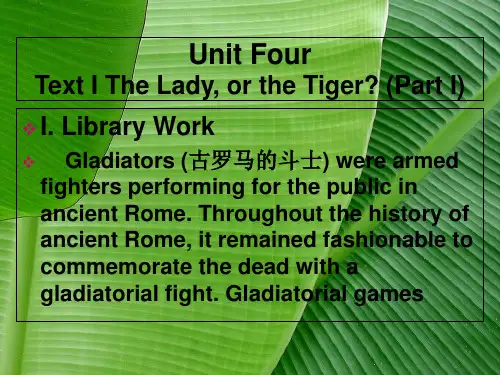
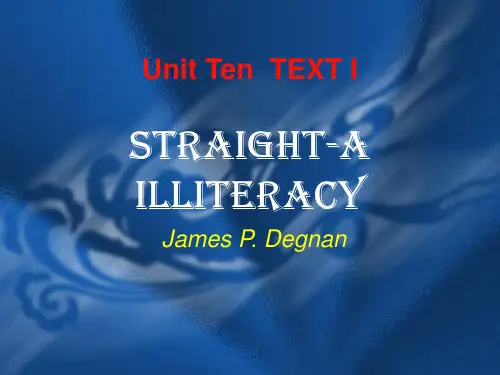

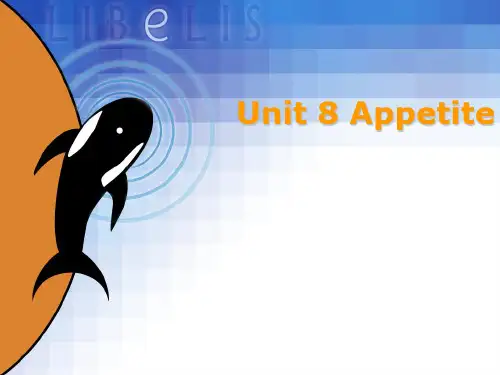
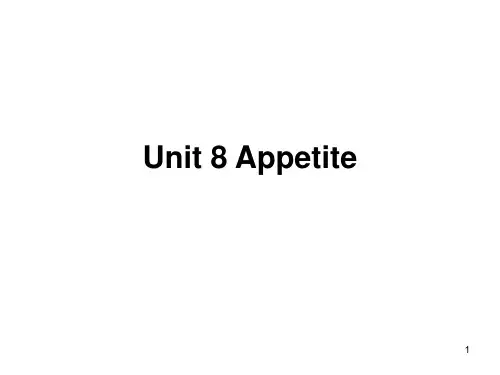
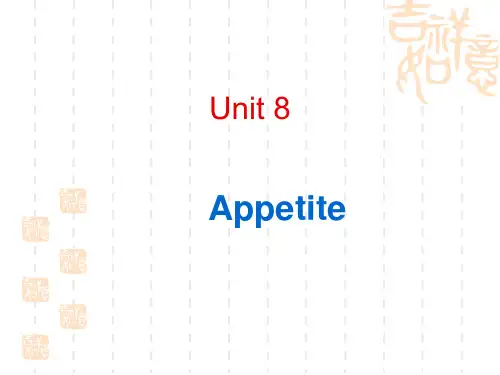
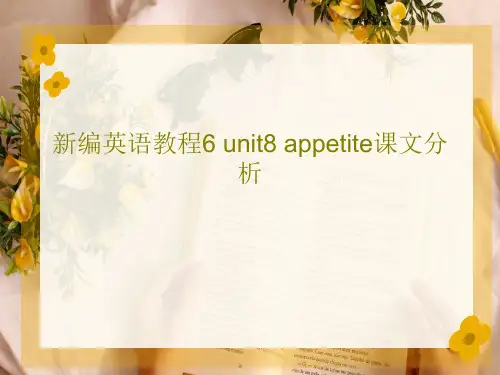
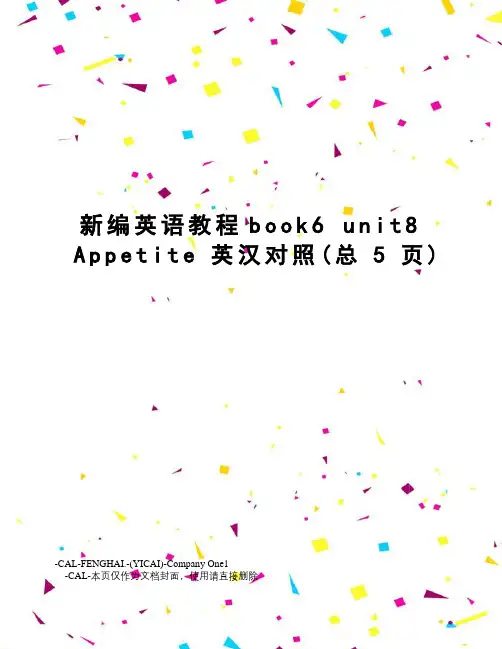
新编英语教程b o o k6u n i t8 A p p e t i t e英汉对照(总5页)-CAL-FENGHAI.-(YICAI)-Company One1-CAL-本页仅作为文档封面,使用请直接删除: very numerous, various;:strong desire;violent desire to possess sth;欲望: wild festivity;wild parties纵欲欢饮: quality特性; feel触觉,appearance of a substance;:force somebody into (doing sth); beat;:;repletion;satiety,the state of being satisfactorily full ,a large, usually lavish, meal;: pleasure;greatsatisfaction;gratification of one’s desire ;: honor or respect for; high regard for;: stuff/fill oneself completely with food;饕餮: powerlessness;paralysis:to get weakened ,becomeweakerAppetite(渴望)(Laurie Lee)(萝莉·里)One of the major pleasures in life is appetite, and one of our major duties should be to preserve it. 渴望乃生活之一大乐事,而心怀渴望则成为一项重要的任务。
Appetite is the keenness of living; it is one of the senses that tells you that you are still curious to exist,that you still have an edge on your longings and want to bite into the world and taste its multitudinous flavors and juices.渴望意味着对生活充满热情,这种感觉表明你依然希冀生活,热衷梦想,向往探索世界,历尽世间百味百态。
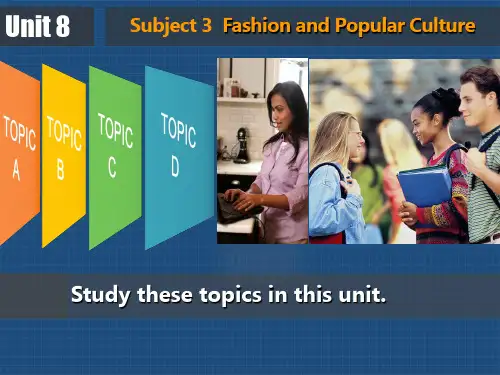
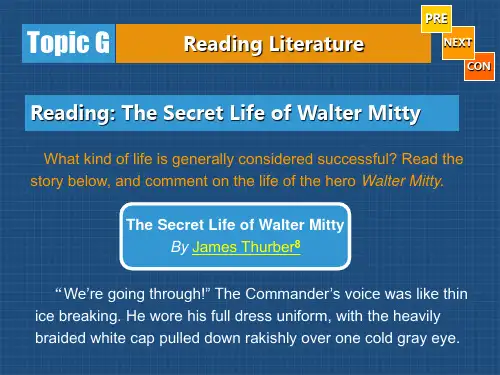
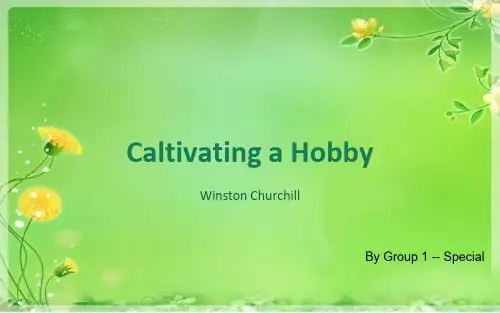
Pre-Class DiscussionWhat occurs to you when you hear the word “appetite”?What does “appetite”mean in the following sentences?E.g. He has a gigantic appetite and eats gigantic meals.E.g. He has strong appetite for success.What are the dictionary definitions of “appetite”?If you have an appetite for food or something else, do you want to satisfy it? Will you feel disappointed if your appetite is not satisfied?Pre-Class DiscussionAbout the authorLaurence Edward Alan "Laurie" Lee, (June 26, 1914 –May 13, 1997) wasan English poet, novelist, and screenwriter, raised in the villageof Slad, Gloucestershire. His most famous work was an autobiographical trilogy which consisted of Cider with Rosie (1959), As I Walked Out One Midsummer Morning (1969) and A Moment of War (1991). The first volume recounts his childhood in the Slad Valley. The second deals with his leaving home for London and his first visit to Spain in 1935, and the third with his return to Spain in December 1937 to join the Republican International Brigades.About the author●What’s Laurie Lee’s full name?●Laurence Edward Alan Lee●What was his nationality? American or English?●English●What was his occupation?●An English poet, novelist, and screenwriter●What’s his most famous work?●An autobiographical trilogy which consisted of●Cider with Rosie (1959),●As I Walked Out One Midsummer Morning (1969)● A Moment of War (1991).Theme●What’s the theme of the article?●Is the author suggesting we should satisfy●our appetite as soon as possible?●If we want to make our life really enjoyable,●we should give up our food as well as●pleasures regularly so as to keep●ourselves in a state of keen desire,●loss of which is a sort of death.●Background of the themeLee's philosophy towards human life grows out of a society where too much material enjoyment, rather than too little of it, has become a problem, especially for upper-class people.The rich are nearly bored to death by the affluent life and, naturally, wish to find a way to lift themselves out of the weariness of their easy existence. Against this particular background of Western society. Lee's teaching is by no means pointless.Organization of the textIntroduction: point out the importance of appetiteParagraph 1Body: further define the term “appetite”and illustrate its importanceParagraphs 2-6Conclusion: restate the main ideaParagraphs 7-8Text analysis●Paragraph 1●edge: n. (as a personal attribute) keenness, as of desire or enjoyment; zest;excitement●-- to have an edge on / over somebody:●to have a slight advantage over somebody● E.g. I have an edge over him in the election: I’m more likely to win the election.●There is an edge to somebody’s voice: He sounds angry or●bitter.●-- be on edge: tense, nervousText analysis●Paragraph 1●bite into: 1) (lit) to put one’s teeth into;● E.g. People with false teeth find it difficult to bite into apples.●2) (fig) to damage on the surface;● E.g. Acid bites into metals.●3) (in the text) with literal meaning, but used metaphoricallyText analysis●Paragraph 1●multitude: n. a very great number; the masses; the populace;● E.g. stars in multitude●the concerns of the multitude.●multitudinous: adj. very numerous; existing in great numbers; crowded● E.g. He was splendidly sunburnt, even his multitudinous beard.Questions●Paragraph 2●How do you explain the paradox in Wilde’s quotation?●Those whose desires are always satisfied are more pitiable, because there is nomore longing in life, what is left is nothing but boredom.●(Refer. to Churchill’s “Hobby”in which men are classified into those who are1) toiled to death; 2)worried to death; 3) bored to death. “Those who cancommand everything they want, who can gratify every caprice and lay their hands on almost every object of desire are the most unfortunate.”)Text analysis●Paragraph 3●orgy: n. uncontrolled or immoderate indulgence in an activity; wild drunkenfestivity/party;● e.g. an orgy of spending.●orgiastic: adj. of or resembling an orgy;Text analysis●Paragraph 3●pitch: n. 1) point, level, degree (of excitement, anger, etc.)●2) The pitch of a sound is its degree of highness or lowness. e.g.●-- Her voice dropped to a low pitch.●-- Her frustration mounted to such a pitch of anger that she could no longer keepsilent.●--Excitement about the wedding is now at fever pitch.Text analysis●Paragraph 3●imperceptible: adj. incapable of being perceived by the senses and intellect; so subtle,slight, or gradual as to be barely perceptible;● e.g.●-- an imperceptible drop in temperatureText analysis●Paragraph 3●gross: adj., n. 1) total;● e.g. gross profits; --gross interest / earnings●2) glaringly obvious; flagrant; e.g.●-- gross inequalities in wealth power and privilege●-- gross negligence●3) brutishly coarse, as in behavior; crude; offensive; disgusting; e.g. gross language●4) large and ugly; e.g. gross architecture●5) big or bad; e.g. gross mistakeQuestions●Paragraph 3●How does the author define “appetite”? List the various versions of definitiongiven by the author in the first three paragraphs.●1) Para. 1 Appetite is “the keenness of living”;●2) Para. 2 “By…, I don’t mean…, but any condition of unsatisfied desire.”●3) Para. 3 “for appetite, to me, is this state of wanting”.Questions●Paragraph 3●What does the author conclude from his experience of eating his long-covetedtoffee? What generalization does he make from this conclusion?●Conclusion: Once the toffee was gone, one was left with nothing, neither toffeenor lust;●Generalization: So one of the keenest pleasures of appetite remains in thewanting.Text analysis●Paragraph 4●be at its most flawlessly perfect: at best;●flawless: adj. being entirely without flaw or imperfection; perfect; having noflaw;● e.g.●-- This policy is flawless.●-- Her complexion is flawless.●-- People expect a beautiful woman to be flawless while a handsome man isallowed to have some flaws in his features.●flawed: adj. e.g.● We are all flawed in some way. ( i.e. No one is infallible.)● This is a flawed argument.Text analysis●Paragraph 4●fasting: n. (lit) going without (certain kind of) food, esp. for religious reasons; ●(extended) temporary denial of pleasure;Text analysis●Paragraph 4●bludgeon: v. (fml)●1) to bludgeon somebody is to hit somebody several times with a heavy object;●2) to bludgeon somebody into doing something is to make somebody dosomething by bullying or threatening.●3) (in text) (lit) to hit or knock it so hard that it loses consciousness; (fig) todestroy it by over indulgence;Text analysis●Paragraph 5●blow-out: n. large meal;●blow out: v. to fill something / somebody with air or food; e.g.●-- The child blew the paper bag out and then burst it.●-- I feel blown out after that heavy meal.Questions●Paragraph 5●In what way is the author’s notion of fasting different from the fasting practicedby puritans?●Their purposes differ:●Author: for better appetite, i.e. to anticipate a rare moment of supremeindulgence; to be prepared for greater pleasure;●Puritan: for asceticism, i.e. to deny oneself the material comfort, to refuse toaccept pleasure;Questions●Paragraph 6●The author says “sailors and travelers enjoyed this once, and so did hunters”.●What does the word “this”refer to?●(The moment that renews / refreshes both oneself and the thing one loves.) Questions●Paragraph 6●Can you explain why the author refers to “sailor”, “travelers”and “hunters”rather than farmers?●Famers do not experience this being away from home for long, thus the momentof coming to home is not cherished as much as by sailors, travellers, and hunters.Text analysis●Paragraph 6●homage: n. respect; honor; e.g.●pay homage to something / somebody●The young soldiers gathered to pay homage to the new heroes.●Every day there are visitors from all over the world who come to the Stratfordupon Avon to pay homage to Shakespeare.Text analysis●Paragraph 6●on top of:●1) something happens on top of other things means it happens in addition toother things; e.g.●-- You don’t want to give the poor man ulcers (troubles) on top of all theproblems he’s already got.●2) If you are on top of what you are doing, you are dealing with it successfully;e.g.●-- There are the jobs that we never really got on top of.●3) If something gets on top of you, it makes you feel depressed because youcannot cope with it. e.g.●-- find the house work is getting on top of me.Text analysis●Paragraph 6●gorge: v. to stuff with food;●to gorge or gorge oneself: you eat very greedily until you’re so full that youcannot eat any more.● e.g. They gorge themselves on rich food.Text analysis●Paragraph 6●to come into one’s own:●1) receive one’s due(得到应得的); to achieve recognition (获得承认):● e.g. In the 1980s, those veterans who were persecuted during the CultureRevolution eventually came into their own.● c.f. on one’s own: alone;●of one’s own: belonging to oneself alone; e.g.●We want to write a book on our own.●She has troubles of her own.●This type of glass has a color and character all of its own.Text analysis●Paragraph 6●serve up: to provide (usu. a meal); e.g.●It is time to serve up a main course.●Are you ready to serve up? Everyone’s at table.Questions●Paragraph 6●What specific conclusions does the author reach after making the contrast?●1) (For people in primitive society) The long-awaited meal became a feast, there-union became a celebration of life.●2) T oo much of anything creates a kind of impotence in living.●( i.e. If there are things for you to strive for, you will have purpose in your life; Ifthere are no longer any desires in you, there is nothing you expect from life. Life to you is meaningless and pointless.)Text analysis●Paragraph 7●impotent: adj. lacking physical strength or vigor; weak; powerless; lacking allstrength; helpless; e.g.●-- The city government seems impotent in dealing with the rising crime rate.● c.f. impotence: n. (antonym of effectiveness), e.g.●-- The cut back in funds will leave this project in a state of impotence.Text analysis●Paragraph 7●divinity: n. 1) quality of being divine; 2) the study of the Christian religion;● e.g. a degree in divinity●divine: adj. holy; belonging to God; e.g.●Nancy made the most divine chocolate cake we had ever tasted. (i.e. more thanhumanly excellent)Text analysis●Paragraph 7●blunt: v. (antonym of sharpen) If something blunts an emotion or feeling, itweakens it, e.g.●-- His personality was blunted a great deal during the Cultural Revolution.Text analysis●Paragraph 7●bliss: n. extreme happiness; ecstasy; the ecstasy of salvation; spiritual joy; e.g.● the road to eternal bliss● What bliss it is to go on holiday!Text analysis●Paragraph 8●parched: adj.●1) (of ground or plant) very dry; e.g.●-- the parched plain of India●2) (of mouth, throat, or lips) unpleasantly dry; e.g.● She touched her wet fingertips to her parched lips.● Give me a drink. I’m parched.。